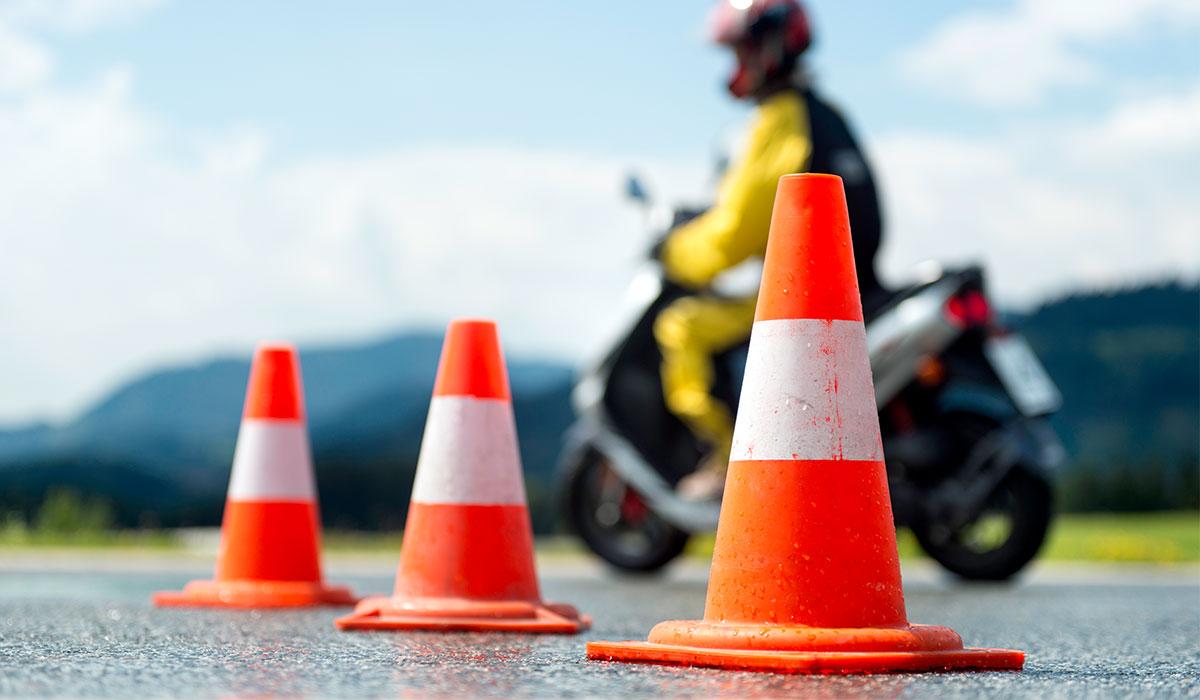
With social distancing overshadowing traditional summer outdoor activities, if you’re finding yourself looking for a positive way to get outside without putting yourself at risk, you might want to put away the breadmaker and sign up for Basic Motorcycle Rider’s Classes.
If you’re afraid of the safety risks of riding with only two wheels on the road, TMCC Safety Center Manager Scott Alquist has seen this class prepare most riders for the rigors of the road, and the skills to keep them safe. A motorcycle rider himself of 46 years, Alquist said social distancing happens naturally on the bike where, at 65 mph, you’re more likely to catch the wind in your face and some impressive views than you are to catch COVID-19.
Intrigued? The 20-hour, three-day course is offered through TMCC’s Applied Technologies Division and is hosted at the William N. Pennington Applied Technology Center. It’s $150 to register, and takes place over the course of a Friday night, all day Saturday session and Sunday (which may end early, depending on the skill level of the riders in attendance). The course is comprised of a written exam and learning basic operational skills required to pass a riding evaluation and complete a mandatory electronic course online before the first night’s class. Any additional questions on what to bring or to expect can be found in the course description when participants register.
There are a few restrictions, however: you have to be at least sixteen years old to take the class, you need to be tall enough to ride (you need a 30-inch inseam) and to have the necessary hand/eye coordination skills to operate a motorcycle safely. You also need to be a Nevada resident.
“I field about a dozen calls plus from people who live in California who want to take the course,” Alquist said. “I have to explain to them that in California, there’s no reciprocity. They don’t recognize our course, they have their own that’s proctored through the [California Highway Patrol (CHP.)”
You won’t need to bring your own bike (TMCC will provide those), but you will need to bring your own helmet for the opportunity to earn your completion card and license waiver that can stand in for your motorcycle license until September 13 (the endorsement required for a motorcycle license is typically issued by the Department of Motor Vehicles.)
The reasons to take the class are many: beginners who’ve never ridden before will learn basic safety and operational skills, while seasoned veterans can learn the nuances of safe riding. All participants who complete the class also may receive a discount on their motorcycle insurance. No matter the reason, Alquist promises an environment where young, old, and everyone in between is sure to learn more about safety and motorcycle riding.
The program resumed classes on Friday, June 5, and in addition to keeping students safe on their motorcycles, there’s also a distinct focus on keeping them safe in the classroom, too.
“With the COVID-19 pandemic, we are practicing social distancing in the classroom and on the range. Also, the first night of class, all staff and students have paperwork to complete and have their temperature checked. All classrooms and motorcycles are disinfected after each use and, as I'm sure you all can understand, we are no longer providing loaner helmets,” said Alquist. “We take the safety of staff and students very seriously.”
With only eight spots available per class, the student-to-instructor ratio is rich and allows for personalized instruction tailored to each student’s needs. Even so, taking the class doesn’t guarantee that you’ll pass. Showing up late, not attending all classes, failing to show progression could all result in your not completing the course.
However, even though success isn’t guaranteed, it happens. One student obtained a perfect score in last week’s safety class. “We also had a perfect score from a young lady who had never been on a motorcycle before, yet she aced her riding evaluation,” said Alquist.
In addition to overseeing the program, Alquist also manages a Facebook page for motorcycle enthusiasts that includes safety advice, local “recon” tips offering suggestions for pleasant rides, good places to eat, among other interesting pieces of information.
So why ride? “For me, [riding a motorcycle] allows me to de-stress,” said Alquist. “One day a week, I go and throw my leg over that bike and get out with some friends, and go riding to clear my head. So, it’s a great stress reliever.” Alquist also cites better parking opportunities at events and meeting members of the close-knit motorcycle-riding community as additional perks of learning to ride a motorcycle. Plus, it goes without saying: it’s fun!
So, if summer’s got you dreaming of feeling the warmth of the sun and the wind in your face on the way to new (safe) adventures, taking this Basic Motorcycle Rider Course can kick-start this socially-distanced summer dream.
“You can socially distance at 65 mph if you get a motorcycle license,” said Alquist.
For more information about the Basic Motorcycle Safety Course, contact the TMCC’s Division of Applied Technologies at 775-856-5300.






